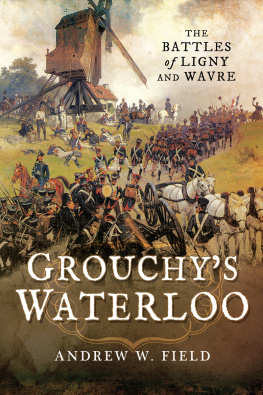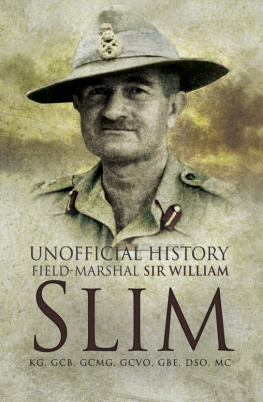This edition is published by PICKLE PARTNERS PUBLISHING
Text originally published in 1888 under the same title.
Pickle Partners Publishing 2011, all rights reserved. No part of this publication may be reproduced, stored in a retrieval system or transmitted by any means, electrical, mechanical or otherwise without the written permission of the copyright holder.
Publishers Note
Although in most cases we have retained the Authors original spelling and grammar to authentically reproduce the work of the Author and the original intent of such material, some additional notes and clarifications have been added for the modern readers benefit.

LETTERS AND JOURNALS
OF
FIELD-MARSHAL
SIR WILLIAM MAYNARD GOMM, G.C.B.
COMMANDER-IN-CHIEF OF INDIA, CONSTABLE OF THE TOWER OF LONDON
&c. &c.
FROM 1799 TO WATERLOO, 1815
EDITED
BY FRANCIS CULLING CARR-GOMM
H.M.'S MADRAS CIVIL SERVICE
'How youngly he began to serve his country,
How long continued'
CORIOLANUS
WITH PORTRAITS
T HIS E DITION P ICKLE P ARTNERS P UBLISHING 2011
LONDON
JOHN MURRAY, ALBEMARLE STREET
1881
TO
HIS ROYAL HIGHNESS
GEORGE, DUKE OF CAMBRIDGE, K.G. &c.
Field-Marshal Commanding-in-Chief Her Majesty's Army
This Brief Memorial
OF A FELLOW-SOLIDER WHOSE HONEST WORTH AND LOYAL SERVICES
WERE VALUED AND ACKNOWLEDGED BY
FOUR GENERATIONS OF THE ROYAL FAMILY
IS, BY HIS ROYAL HIGHNESS'S GRACIOUS PERMISSION
Humbly Dedicated
PREFACE.
THE PAPERS of Field-Marshal Sir William Gomm were in some measure arranged by himself; but Lady Gomm, during her brief widowhood, set herself most religiously to collect them, and in some way prepare them for publication. Her Hill bequeathed all the manuscripts to General Lord Mark Kerr, the Hon. Edward Douglas, and Miss Augusta Howard Vyse, to be retained or published as they should think fit. They confided the papers to my care, and requested me to examine and edit them. I have at present only been able to take the earlier portion of these letters; but they to a great extent form so independent and complete a chapternot only of his life, but of public historythat it has been decided to publish them separately, leaving to some future opportunity the project of preparing for the public the later voluminous and more general papers.
Although these letters relate to days long gone by, yet even now such a genuine, truthful, and intelligent record as they present of the desperate struggle with which the nineteenth century opened in Europe, has both its value and interest, not only for the sons and grandsons of those who took part in it, but for all lovers of their country. Every page displays the well-read scholar and man of refined feelings and high character. No one can peruse without emotion the simple and unpretending account of the soldier-boy's first coming under fire, a few weeks after joining his regiment, in the bloody engagement with the French among the sand dunes of Holland. The same coolness and courage carried him through every campaign, almost every battle of the war, from the Helder, Walcheren, and Corunna, to Torres Vedras, Bayonne, and Waterloo, all of which are more or less fully described in these pages.
My own part in this compilation as editor has been but small. My chief difficulty has been selection. I have introduced words of my own only when I feared the continuity of the narrative might be spoilt without a few connecting links. The history of the great war is so well written by historians, and so intimately known to every intelligent Englishman, and especially to every soldier, that little more than a few touches seem necessary to recall the whole subject to the reader, so as to obviate the necessity of refreshing the memory by taking down the history from the shelf.
I am indebted for these letters, and the excellent preservation in which I find them, to two loving women who took complete charge of them at the earlier and later part of the honoured writer's life. First to her to whom most of them were originally addressed, and who preserved, copied, and docketed them with all a sister's pride and love; and secondly to her to whom those old yellow bundles, well known and often talked about during forty-five years of wedded life, seemed the most sacred and precious of manuscripts, since they told how he had won his spurs in the years before they met. From her they have now passed to other hands, in which they are esteemed a sacred trust, and are valued for their own intrinsic merit. I hope and believe they will be similarly valued by the public.
F. C. CARR-GOMM.
CONTENTS.
CONTENTS.

LETTERS AND JOURNALS
OF
SIR WILLIAM MAYNARD GOMM.
CHAPTER I.
INTRODUCTORY.
THE LIFE of Sir William Gomm covered ninety years; his public and active life commenced at an age when most boys are leaving a private and entering a public school, and that life continued to be not only active but public for three quarters of a century.
It may be divided into four distinct periods, each of about twenty years:
I. From 1799 to 1816, a purely active military life in the great war against France in Holland, Portugal, Spain, and Belgium; of which period I will speak more in detail hereafter.
II. From 1817 to 1839, home military life; when he advanced from the rank of lieutenant-colonel in the Coldstream Guards to that of major-general. It was during this period that he marriedfirst, Sophia Penn, the granddaughter of William Penn, of Pennsylvania, who died in 1827; and, secondly, Elizabeth Kerr, the eldest daughter of Lord Robert Kerr, who, after forty-five years of wedded life, during which husband and wife were hardly for a day separated, survived him only two years. He had no issue by either of these marriages. During this period he lost the protectors of his youthviz. his cousin, the Rev. W. Gomm, of Bramdean, and his aunt; Miss Gomm, who had supplied to him the place of the parents that lie had lost in infancy. Owing to the death of his brother and sister, he succeeded to all his aunt's property upon her death in 1822, and became lord of the Manor of Rotherhithe, inheriting a property which had come through the Goldsworthys, with whom the earlier part of his life was so intimately associated. During this period of his life he travelled in different parts of Europe, devoting a considerable portion of his spare time to literature.
III. From 1839 to 1856, colonial administrative life. From 1839 to 1842 he held the chief command and was Member of Council at Jamaica, during the Administration of Sir Charles Metcalfe. During the short time he filled that post, by his urgent representations to the Colonial Office he succeeded in establishing the mountain barrack of Newcastle; which, from the salubrity of its situation, led to a wonderful improvement in the health of the European troops. For nearly a quarter of a century a succession of British regiments enjoyed there an absolute immunity from yellow fever. Subsequently the charm seemed broken, and the troops at Newcastle became as liable to the scourge as if they had been dwelling in the plains; a calamity which was brought about solely by a cruel neglect of most obvious sanitary precautions. On his return in the spring of 1842 he was gazetted to the command of the Northern District; but in November of the same year he was appointed Governor and Commander-in-Chief in Mauritius, in the place of Sir Lionel Smith, Bart., which appointment he held till 1849. The seven years of his administration of the island were chiefly marked by great financial difficulties, caused by the utter destitution of the labour market and a most unsound system of banking. In dealing with these difficulties the Governor was well supported by the loyal co-operation of the servants of the Crown; but he was much opposed by the unofficial members of the Council. When he resigned office the verdict of the Lords of the Treasury at home was, that he had deserved credit for his proceedings in carrying into effect the instructions he had received for disengaging the Mauritius Government from the transactions and responsibilities of the banks in which the Colonial Treasury and Funds had been implicated by his predecessors in the administration of the Government.' He proceeded from Mauritius to Calcutta, having received from the Horse Guards the intimation that her Majesty had been pleased to appoint him Commander-in-Chief in India. On arrival at Calcutta on June 2, he found thatowing to the panic at home, which resulted from the second Sikh War and the battles of Chillianwallah and Goojerat, and to the jealousy of the Court of Directors of the direct patronage by the Crownhis appointment from the Horse Guards had been superseded, and that Sir Charles Napier had just arrived in Calcutta before him as Commander-in-Chief, and had at once proceeded to the Punjab. Sir William found at Calcutta ample explanations from the Duke of Wellington and Lord Fitzroy Somerset. {1} His disappointment was heightened by the serious illness of Lady Gomm, contracted, it was supposed, while nursing a sick friend. It was not till September that they were able to leave Calcutta; they remained for two months the guests of Lord and Lady Torrington, in Ceylon, and arrived in England in January 1850. In the following August he was appointed Commander-in-Chief of Bombay; but on the eve of starting was appointed to the chief command, owing to Sir Charles Napier suddenly resigning his command, in consequence of differences between himself and Lord Dalhousie. On December 6, he landed in Calcutta, and was sworn in as Member of Council and Commander-in-Chief. The five years of his military command in India were comparatively uneventful, a calm occurring between the Sikh War and the great Mutiny of 1857; and that calm was hardly ruffled by the distant storm which was raging during two of those years on the shores of the Baltic and Black Seas: a suggestive thought for us who have seen in our own day how even a threatened rupture with Russia will now throw our Indian borders into disorder. The cordial relations which existed between the civil and military authorities of that period were due as much to the wise kindheartedness of the Commander-in-Chief as to his intimate personal friendship with Lord Dalhousie. Commenting upon this in a review of his life, one of the leading London journals in 1875 wrote: 'Sir William Gomm's work was always thoroughly and smoothly done, and he had no enemies. The great proof of a person's real worth is to be found in the attachment of those brought into private intercourse with him. Now, all Sir William's associates, especially those who at various times constituted his military family, loved and respected him. In India, where he succeeded the eccentric, impetuous, and prejudiced genius, Sir Charles Napierwho held that every one who was not his partisan was either a fool or a knave, preferably the latter, and most probably bothSir William was extremely popular, and his popularity was much promoted by his wife, who presided over society with much grace and perfect success. None save those who have been in India can realise the fact that the purity and refinement of Anglo-Indian society depend greatly on the qualities of the lady who is at the head of it. At Simla, especially, personal influence and example work wonders; and never was the society of the Capua of India in so healthy a state as when it was presided over by Lady Gomm. Her social, moral, and mental qualities admirably fitted her for the position which she assumed when her friend Lady Dalhousie, after a short stay in India, returned homewards, only to die on the passage; and many an old Indian looks back with affectionate recollection to the time when Lady Gomm was the centre and queen of the society in the beautiful British settlement in the Himalayas.'











